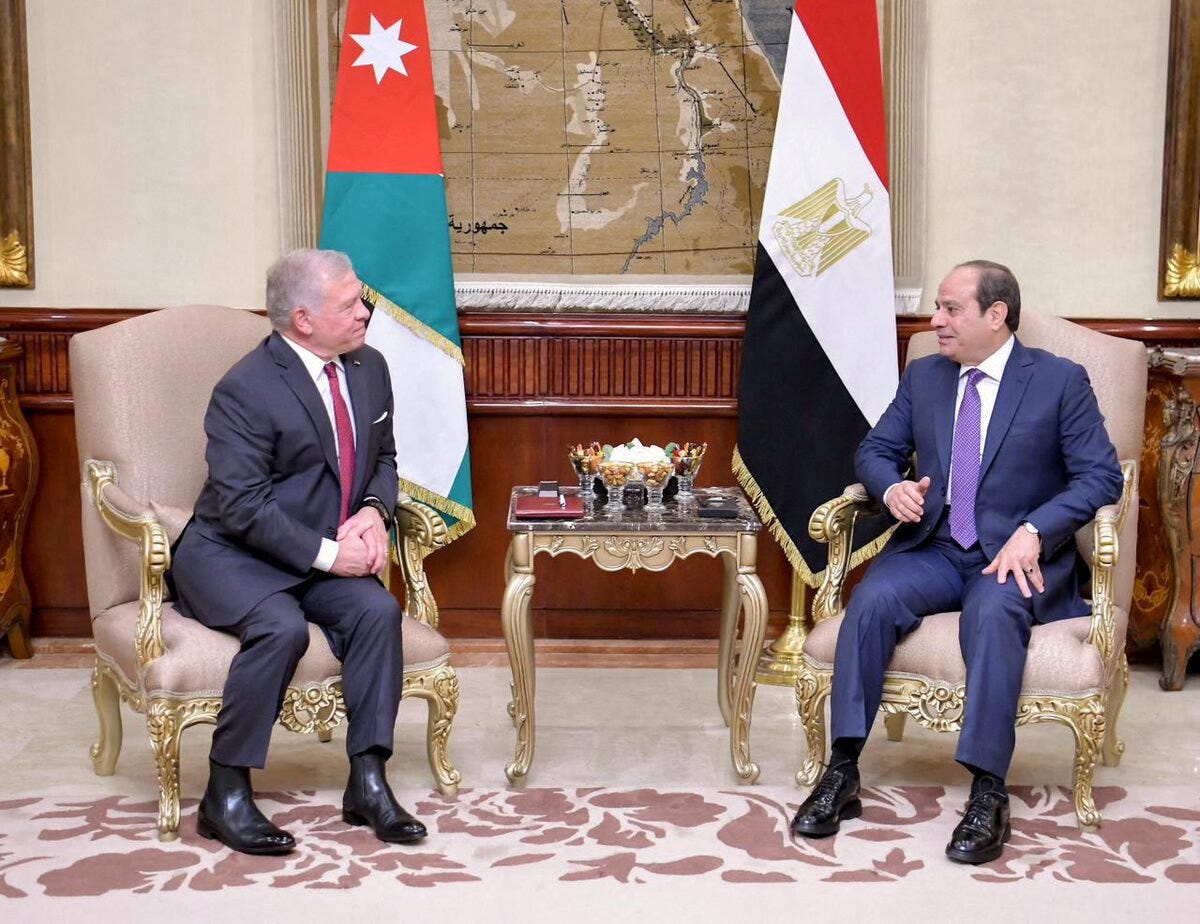Israel’s Arab Neighbors Undermine Their Own Interests by Backing Iran
Leaders should seek national interest, even if unpopular at times

Hussain Abdul-Hussain
The Foundation for the Defense of Democracies
The Islamic Revolutionary Guard Corps (IRGC) and its proxy militias have Jordan in their crosshairs, calling for mass protests against the government and promising to arm a militia of 12,000 Jordanians. Amman, however, inexplicably continues to play nice with Tehran, denouncing on Wednesday an Israeli strike on Damascus that killed half a dozen IRGC operatives, the last in a series of anti-Israel statements since October 7. Similarly, Egypt has been economically reeling from the repercussions of the Gaza war but has yet to align its rhetoric with its national interests.
“Because of its location, Jordan is very important for the [Iran-led] resistance axis,” said Ali Fadlallah, a spokesperson for Kataeb Hezbollah, an Iran-backed Iraqi militia. He added: “Unfortunately, because of the ruling regime, [Jordan’s] location benefits the usurping entity [Israel], and does not offer Palestinian resistance any support.”
Tehran has deployed a two-pronged strategy to undermine the Jordanian state and jumpstart armed militias that would pledge allegiance to the Islamist regime of Iran. On the one hand, Hamas instructed Jordan’s Islamic Action Front — the Jordanian Muslim Brotherhood — to throw its weight behind rallies that Jordanians routinely held in front of the Israeli Embassy in Amman. The number of protesters surged, and slogans became more aggressive, shouting support for Hamas and the Islamic Jihad and blaming the Jordanian government for not doing enough for Gaza.
On the other hand, Iraq’s Kataeb Hezbollah pledged to arm 12,000 Jordanians and supply them with “anti-tank missiles, tactical missiles, millions of ammunition, and tons of explosives, so that we stand as one in defending our Palestinian brethren.”
In December, with assistance from the Mossad, Israel’s intelligence agency, Jordanian police busted smugglers on the country’s northern border with Syria who were trying to sneak arms — including missiles, landmines, and sniper and M16 rifles — to Palestinians in the West Bank.
With Tehran’s persistent effort to undermine Jordan’s security and stability, it was surprising that Amman denounced “the attack that targeted the Iranian consulate in Damascus and killed and injured a number of people … violating international law.”
It is believed that Israel stands behind the attack. However, the strike hit a private building in which the IRGC rents or owns two of the four floors. And while diplomatic immunity, as regulated by international law, protects Zahedi in Syria, it does not apply to Israel.
It is inexplicable why Jordan, which signed a peace treaty with Israel in 1994, has toed a populist anti-Israeli rhetoric and recalled its ambassador but later came back asking, in private, for Israeli desalinated water. The discrepancy between Jordan’s rhetoric and its national interests is glaring. Perhaps it is Amman’s way of absorbing popular anger against the war in Gaza. Yet leaders should seek national interest, even if unpopular at times.
Another Arab country with a decades-old peace treaty with Israel is Egypt, whose public statements disagree with — and rather undermine — Egyptian national interests.
After Hamas massacred 1,200 Israelis on October 7 and started the war in Gaza, the Houthis started attacking international shipping passing through the Red Sea, thus depressing the number of ships that pass through the Suez Canal, and with them the fees that go to the Egyptian treasury.
Since October, Egypt’s revenue from the Suez Canal has declined by 40 percent. Cairo has lost close to $2 billion while the Egyptian economy is suffering an acute economic downturn, forcing the government to borrow $8 billion from the International Monetary Fund.
But like Jordan, Egypt denounced the attack that killed Zahedi in Damascus, cozying up to an Iranian-led axis whose wars are hurting Egyptian interests and doubling down on an antisemitic populist rhetoric that placates popular anger but whose results hurt Egyptians.
Along similar lines, Cairo has refused to open its borders with Gaza to temporarily house Palestinian refugees fleeing the war. Had Egypt agreed to help Israel accelerate the war on Hamas by hosting Gazan civilians and allowing Israel to operate on the Egyptian side of the border, the war in Gaza would have been concluded faster and shipping through the Suez Canal would have been restored to pre-war levels — and so would have Egypt’s revenue.
The Abraham Accords are peace deals signed between Israel, on one side, and the United Arab Emirates, Bahrain, Morocco, and Sudan, on the other. Under these accords, both governments and populations have engaged in genuine peace with the Jewish state. Such peace has increased trade, which in turn boosted the economy, among other benefits.
Older peace agreements between Israel and Arab countries — namely Jordan and Egypt — belong to an outdated model in which the two Arab countries offer Israel cold peace in return for behind-the-scenes security cooperation. As a reward, Egypt and Jordan receive U.S. military and economic aid.
It is unfortunate that neither Jordan nor Egypt leverages their peace with Israel at a popular level to boost their economies and safeguard their security. Should their peace model change, the two countries will reap much more security and economic rewards.
Hussain Abdul-Hussain is a research fellow at the Foundation for Defense of Democracies (FDD), a Washington, DC-based, nonpartisan research institute focusing on national security and foreign policy. Follow Hussain on X @hahussain



So does the US. I mean, the Obama and Biden administrations are ridiculously bad at foreign policy, but both have delivered win after win for Iran with their spineless obsequiousness to serving the goals of Hamas and Hezbollah and the Houthis. It’s amazing how utter shit progressives are at maintaining US interests and projecting power.